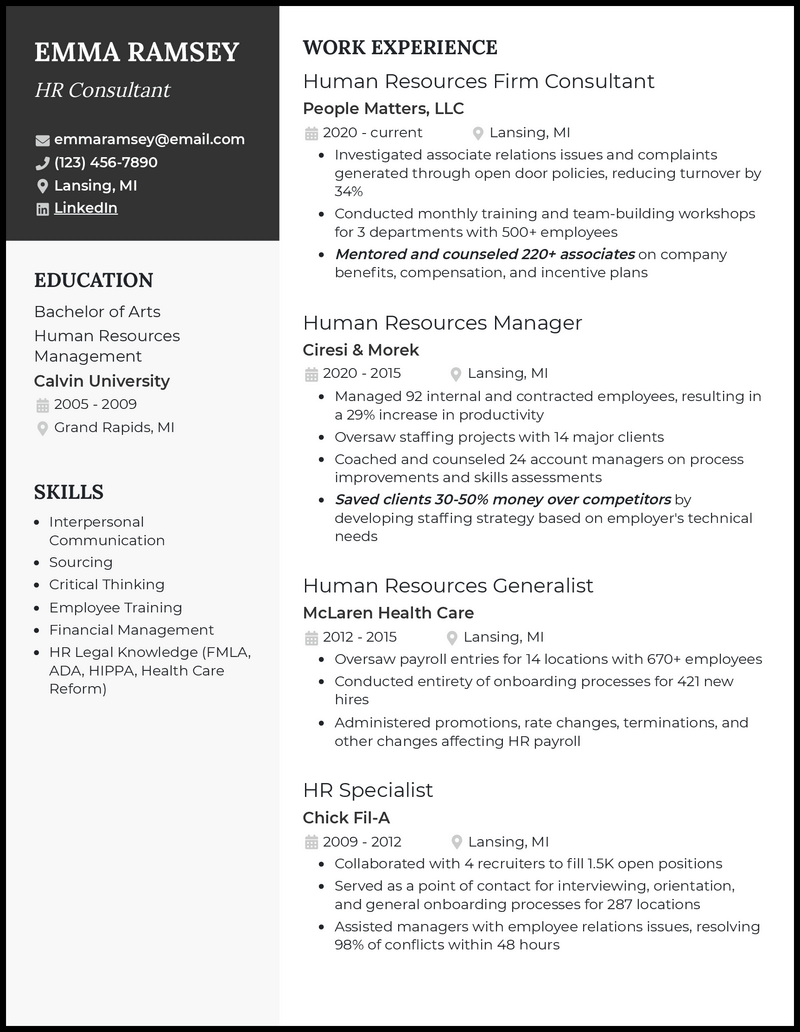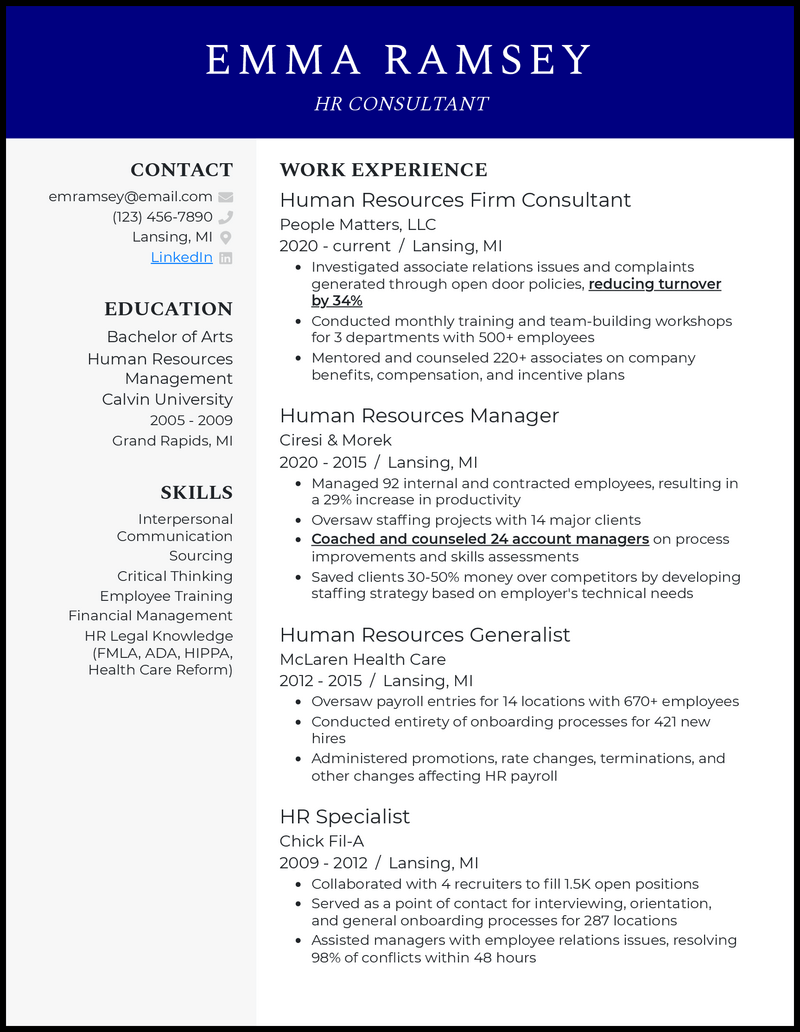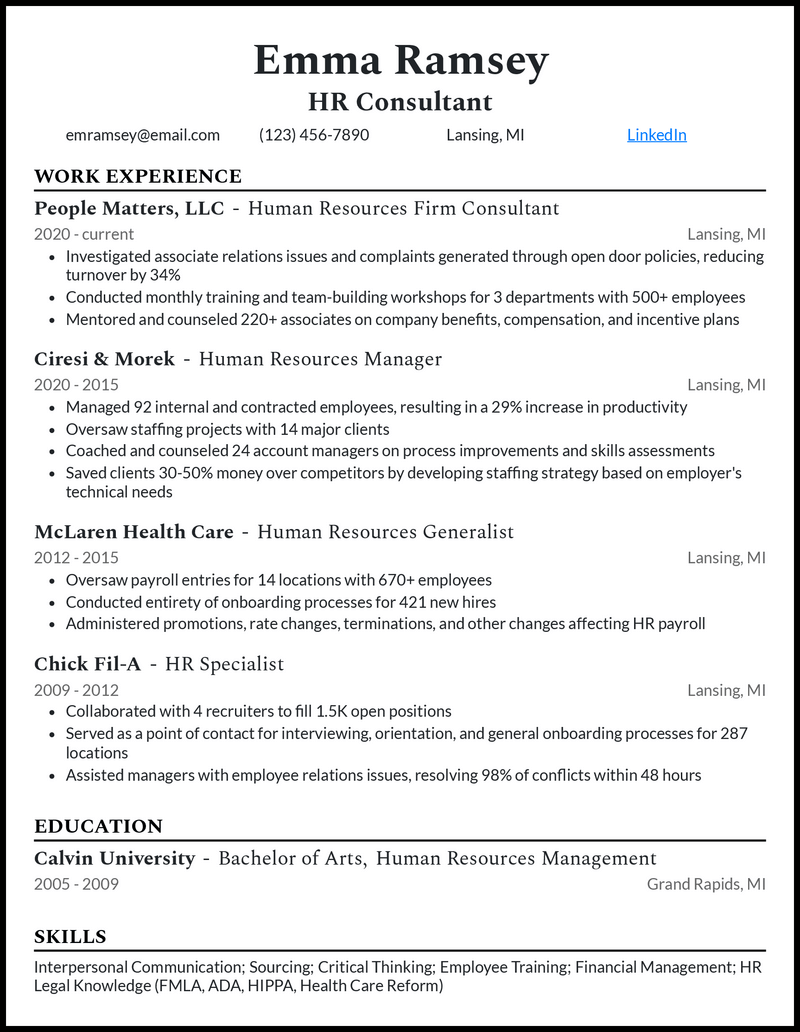You skillfully collect and interpret data to formulate strategic plans to improve each client’s Human Resources team so that everyone’s functioning at peak efficiency. You manage roadblocks by finding creative solutions and offering sound advice on how to get things up and running smoothly.
But you might still have questions about your own resume. How long should it be? What should (or shouldn’t) you include?
No need to worry: We’ve put together three HR consultant resume templates and compiled some time-tested cover letter writing advice that’s helped plenty of job seekers before you. Give our resume samples a try and see what works best!
Copy this text for your hr consultant resume!
Emma Ramsey
HR Consultant
[email protected]
(123) 456-7890
Lansing, MI
WORK EXPERIENCE
Human Resources Firm Consultant
People Matters, LLC
2020 – current
Lansing, MI
– Investigated associate relations issues and complaints generated through open door policies, reducing turnover by 34%
– Conducted monthly training and team-building workshops for 3 departments with 500+ employees
– Mentored and counseled 220+ associates on company benefits, compensation, and incentive plans
Human Resources Manager
Ciresi & Morek
2020 – 2015
Lansing, MI
– Managed 92 internal and contracted employees, resulting in
a 29% increase in productivity
– Oversaw staffing projects with 14 major clients
– Coached and counseled 24 account managers on process improvements and skills assessments
– Saved clients 30-50% money over competitors by developing staffing strategy based on employer’s technical needs
Human Resources Generalist
McLaren Health Care
2012 – 2015
Lansing, MI
– Oversaw payroll entries for 14 locations with 670+ employees
– Conducted entirety of onboarding processes for 421 new hires
– Administered promotions, rate changes, terminations, and other changes affecting HR payroll
HR Specialist
Chick Fil-A
2009 – 2012
Lansing, MI
– Collaborated with 4 recruiters to fill 1.5K open positions
– Served as a point of contact for interviewing, orientation, and general onboarding processes for 287 locations
– Assisted managers with employee relations issues, resolving 98% of conflicts within 48 hours
SKILLS
– Interpersonal
– Communication
– Sourcing
– Critical Thinking
– Employee Training
– Financial Management
– HR Legal Knowledge (FMLA,
– ADA, HIPPA, Health Care
– Reform)
EDUCATION
Bachelor of Arts
Human Resources
Management
Calvin University
2005 – 2009
Grand Rapids, MI
Related resume examples
What Matters Most: Your Skills & Work History

A lot of interpersonal abilities go into your role, and so does a fair amount of technical skill: You need to be able to use legal and technical understanding to develop appropriate plans while you employ soft skills to convey your results to the appropriate people.
Keep your skills list relevant to your particular profession. Include things related to employee benefits, conflict resolution, account documentation, and other HR essentials.
You also want to make sure you keep things as specific as you can. Don’t fall for fallbacks like “communication” that come across as vague and unremarkable! You can do way better with specifics like “employee training” and “data presentation.”
9 top HR consultant skills
- MS Excel
- Employee Training
- Benefits Packages
- Financial Management
- Critical Thinking
- Sourcing
- HIPPA
- Healthcare Reform
- Google Slides
Sample HR consultant work experience bullet points
So, how do you use those skills? Recruiters want to know! It’s one thing to have plenty of abilities at your disposal, and another to show off how you’ve utilized them to further clients’ initiatives successfully.
Make sure each job experience bullet point relates directly to your current role in HR, even if it’s from a different position! Having a somewhat “patchwork” work background is perfectly fine as long as you show that you know how to hand-pick the points that are most relevant.
And don’t forget to measure those success points in your work history! Use quantifiable data to clarify how each of your experiences left a positive impact. Metrics are indispensable when it comes to making a good point.
Here are some samples:
- Assisted managers with employee relations issues, resolving 98% of all conflicts within 48 hours
- Saved clients 30-50% in costs over competitors by developing staffing strategy based on employers’ technical needs
- Managed 92 internal and contract employees with organized strategies, resulting in a 29% increase in productivity
- Investigated associate relations issues and complaints generated through open doors policies, reducing turnover by 34%
Top 5 Tips for Your HR Consultant Resume
- Show a variety of soft skills
- People are complex, and you assist a wide variety of them in your HR consultant role. You need to show that you’re not only familiar with the types of issues that arise in the workplace but also with broader issues that cross departments and companies. Show communication abilities at all levels!
- Concision is key
- When you write out the bullet points in your experience section, make sure you’re getting right to the point with each one. Tell what you did, why you did it, and how you created quantifiable success in the end!
- Context helps, too!
- Context is a great way to boost the impact of your experiences with just a few more words. By providing a very brief slice of backstory, you enrich your accomplishments and add variety to your resume.
- Don’t go visually overboard
- While a nice pop of color can make your resume more memorable, you want it to be memorable in a good way! Don’t use any colors that interfere with readability or contrast. And always use plain, clean, super-legible fonts.
- Never mind the summary
- Why waste page space on a summary or objective statement when you have solid experiences that speak for themselves? Instead, focus on streamlining each experience point to ensure it’s bringing the maximum amount of value.
We really wouldn’t recommend trying! Recruiters only have a few seconds on average to spend during that initial resume skim, and two-page resumes are the least likely to be read through.
While any of our resume templates would make a great starting point, your ultimate goal is to find the one that fits most nicely with your individual set of qualifications. Pick a template that makes your experiences look full and well-organized.
You totally should! An HR cover letter is the perfect home for any experience points that you struggle to part with while trimming your resume down to one page, too: Use the best points as building blocks for your cover letter to bolster your qualifications even more.








